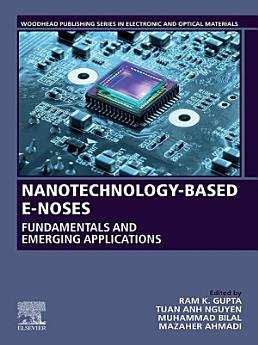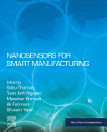Nanotechnology-Based E-Noses: Fundamentals and Emerging Applications
About this ebook
About the author
Ram K. Gupta is a Professor in the Department of Chemistry at Pittsburg State University, USA. His research interests include green energy production and storage using conducting polymers, 2D materials, nanostructured materials and composites, polymers from renewable resources for industrial applications, polymer recycling for sustainable future, bio-compatible nanofibers and thin films for tissue regeneration, scaffolds, bio-degradable metallic implants, and antibacterial applications.
Muhammad Bilal is working as an Associate Professor at the Faculty of Civil and Environmental Engineering, Gdansk University of Technology, Poland. Previously, he served as an assistant/associate Professor at Poznan University of Technology, Poland, and the School of Life Science and Food Engineering, Huaiyin Institute of Technology, Huaian, China. He earned his Ph.D. from Shanghai Jiao Tong University, specializing in bioengineering and applied biotechnology. His main research activities are oriented to Environmental biotechnology, nanotechnology, enzyme engineering, immobilization, chemical modifications, and industrial applications of microbial enzymes, liquid, and solid waste management. He has authored over 700 peer-reviewed articles, 150 book chapters, 25 edited books. Dr. Bilal is the associate editor of Frontiers in Chemical Engineering and Frontiers in Environmental Science (Frontiers), and an editorial board member for several journals. He was listed as a highly cited researcher (Clarivate) in 2021 and holds several "highly cited papers" in WOS.
Dr. Mazaher Ahmadi received his Ph.D. in Analytical Chemistry from Bu-Ali Sina University in 2017. He has been to Alicante University, Spain, and Stockholm University, Sweden, as a visiting researcher in 2015-2016 and 2016-2017, respectively. He became an Assistant Professor of Analytical Chemistry at Bu-Ali Sina University in 2019. His professional experiences also include two post-doctorate research courses at Shiraz University of Medical Science, Iran, and Bu-Ali Sina University, Iran, in 2017-2018 and 2018-2019, respectively. Dr. Ahmadi is an expert in nanotechnology, analytical method development, pollutant removal, and wastewater treatment. He has edited six Elsevier books. He also has contributed eleven book chapters with Elsevier.
Tuan Anh Nguyen is Senior Principal Research Scientist at the Institute for Tropical Technology, Vietnam Academy of Science and Technology, Vietnam. He received B.S. in Physics from Hanoi University in 1992, and Ph.D. in Chemistry from the Paris Diderot University (France) in 2003. He was Visiting Scientist at Seoul National University (South Korea, 2004) and University of Wollongong (Australia, 2005). He then worked as Postdoctoral Research Associate and Research Scientist in the Montana State University (USA), 2006-2009. In 2012, he was appointed as the Head of the Microanalysis Department at Institute for Tropical Technology. His research activities include smart sensors, smart networks, smart hospitals, smart cities and digital twins. He edited over 70 Elsevier, 12 CRC Press, 1 Springer, 1 RSC and 2 IGI Global books. He is Editor-In-Chief of "Kenkyu Journal of Nanotechnology & Nanoscience".








